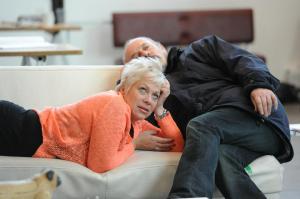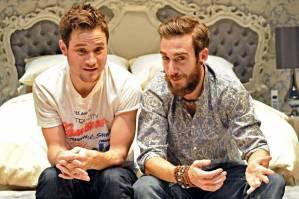
Maya Alexander and Andrew Sheridan in One Day When We Were Young. Photo: Elyse Marks
After a few weeks where my theatre consisted of Shakespeare, Ibsen, a revival of an eighties play and a Chekhov that didn’t look like Chekhov, it was great pleasure to go back to new writing. With a packed schedule and within twenty four hours, I saw four plays from four young playwrights (you are getting old when the playwrights start looking younger): first it was This House by James Graham at the National Theatre, and the next day, the Roundabout season, three plays in a single afternoon, produced by Paines Plough and Sheffield Theatres and performed at the Shoreditch Town Hall.
Three playwrights, all under 35, three different visions all performed in the same intimate, almost inescapable, space:
One Day When We Were Young by Nick Payne: My favourite piece of the day, especially the second act, tenderly performed by Andrew Sheridan and Maya Alexander. Nick Payne is currently riding an immense high, with Constellations at the Royal Court being a huge success (and transferring to the West End) and his play “If There Is I Haven’t Found It Yet” playing in New York. “One Day When We Were Young” is a story of an unlikely and brief love affair that marks two people in different ways for the next sixty years. Payne’s writing probes difficult places of loneliness and heartbreak, and the actors, especially Andrew Sheridan (who has the rare ability of drawing you in so effectively and with so little fanfare that takes you by surprise) make the play justice. Continue reading →



